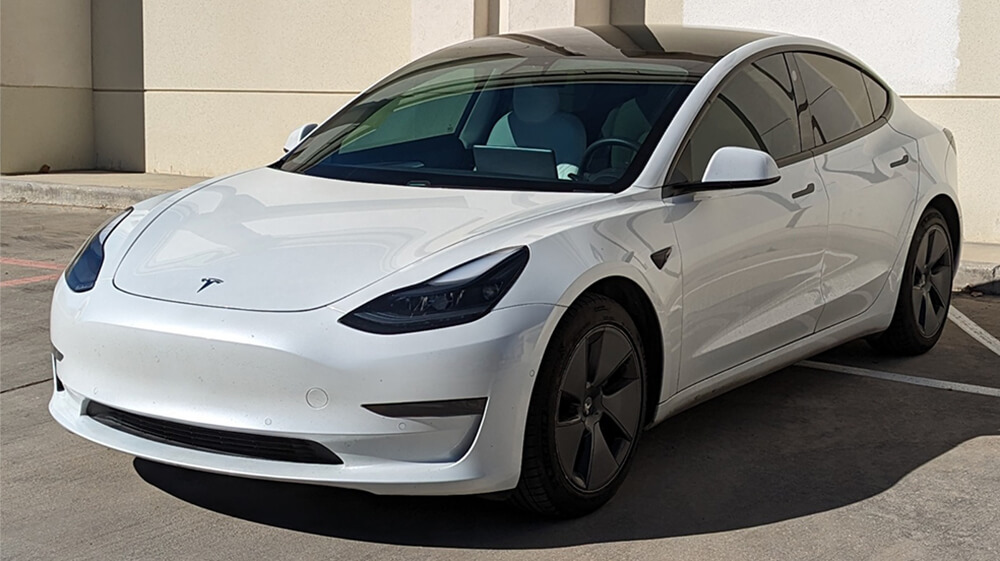Now that the Federal used EV tax credit is available for US taxpayers, let’s discuss how it works and how to qualify.
The used EV tax credit (officially known as the Used Clean Vehicle Credit) works as a three-part system. First, the individual applying for the credit has to meet income and other tax-related qualifications. Second, the used EV also has a list of eligibility criteria. Third, to actually file for a used EV credit, the buyer must have the sale processed through a qualified dealer.
You may have noticed that last part: the sale needs to take place through a qualified dealer. Does that prevent you from buying a used EV from a private seller and getting the used EV credit? Actually, no. You can still get the Used Clean Vehicle Credit for a private sale under the right circumstances.
But before we can dive into how to get the used EV tax credit in a private sale, we need to explain the big-picture on how you can personally qualify for the Used EV Tax Credit and which EVs may meet the credit criteria.
As we get started, we need to add the following disclaimer: this article is for informational purposes only, and is not intended to provide, and should not be relied on for, tax, accounting, or legal advice. While we are experts in EVs and strive to stay up-to-date on EV-related tax laws, we’re not tax professionals. Please consult your own tax, accounting, and legal advisors before engaging in any transaction.
How You Qualify for the Used EV Tax Credit
For the first part of the qualification equation, the buyer of the used vehicle has to meet income and other eligibility requirements. You’ll only be able to claim the tax credit on a used electric vehicle if:
- Your Modified Adjusted Gross Income (MAGI) is equal to or less than $150,000 filing jointly, $75,000 filing individually, or $112,500 filing as head of household. Note: The IRS gives you a little leeway here, since you can apply either this year’s or last year’s filing info to the MAGI requirement.
- You are purchasing for personal use, not for resale
- You have not already claimed one used EV credit in a 3 year period
- You are not someone else’s dependent (we think this is obvious, but we figure it still needs to be said)
- You are not the original owner of the EV (no buying a used EV from yourself!)
It’s worth noting that only individual consumers are eligible for the used Clean Vehicle Credit, not businesses.
If you pass all of the qualifications for the credit, then you can start narrowing down your list of qualified vehicles:
How an EV Qualifies for the Used EV Tax Credit
For the next part of the Clean Used Vehicle Credit eligibility equation, the used EV that you are planning to buy must meet the following criteria*:
- The used EV must be two years past its model year (for example, a 2022 Tesla Model Y would not be eligible for the used EV credit until 2024).
- The sales price of the used EV must not exceed $25,000
- The used EV has not been previously transferred to a new owner (i.e., the current owner bought the EV new from a dealer)
- OR the used EV must be on its first transfer—not having been sold or titled to a new private owner—since August 16, 2022, which is the day the legislation to create the used EV credit took effect
- The used EV must be purchased through a qualified dealer
*Additional vehicle restrictions to the credit also apply, but most of those involve specs that are geared towards plug-in hybrids, commercial vehicles, or location-of-use intent (for example, the vehicle may not qualify if you intend to buy in the US but intend to drive it mostly in Canada). You can view the full list of restrictions here.
The non-refundable credit goes up to $4,000 or 30% of the used EV’s sales price (whichever is lower). For example, a used 2017 Chevy Bolt selling for $14,000 could qualify for the full $4,000 credit ($14,000 x 0.3 = $4,200, so $4,000 is lower), but a 2015 Nissan Leaf selling for $10,000 could only qualify for a $3,000 credit ($10,000 x 0.3 = $3,000, which is lower than the $4,000 maximum).
Electric Vehicles that May Qualify for the Clean Used Vehicle Credit
The following used electric vehicles may be eligible for the used EV tax credit in 2023 (and 2024):
Make/Model |
Model Year (*eligible for 2024 credit) |
|---|---|
| Audi E-Tron | 2019-2021 (2022*) |
| BMW i3 Sedan | 2014-2021 |
| Chevy Bolt | 2017-2021 (2022*) |
| Chevy Spark | 2014-2016 |
| Fiat 500e EV | 2013-2019 |
| Ford Focus Electric | 2012-2018 |
| Ford Transit Connect Electric Cargo Van XLT | 2012 |
| Hyundai IONIQ Electric Battery Vehicle | 2017-2021 (2022*) |
| Hyundai KONA Electric | 2019-2021 (2022*) |
| Kia Niro EV | 2019-2021 (2022*) |
| Kia Soul EV | 2015-2020 (2022*) |
| Mercedes-Benz B-Class EV (B250e) | 2014-2017 |
| MINI Cooper S E Hardtop | 2020-2021 (2022*) |
| Nissan Leaf (All Models) | 2011-2021 (2022*) |
| Polestar 2 | 2021 (2022*) |
| Porsche Taycan | 2020-2021 (2022*) |
| Smart USA Cabrio EV | 2013-2015, 2017-2018 |
| Smart USA Coupe EV | 2013-2018 |
| Smart USA EQ Fortwo Cabrio | 2019 |
| Smart USA EQ Fortwo Coupe | 2019 |
| Tesla Model S | 2012-2021 (2022*) |
| Tesla Model X | 2016-2021 (2022*) |
| Tesla Model 3 | 2017-2021 (2022*) |
| Tesla Model Y | 2020-2021 (2022*) |
| Tesla Roadster | 2009-2011 |
| Toyota RAV4 EV | 2012-2014 |
| Volkswagen e-Golf | 2015-2019 |
| Volkswagen ID.4 | 2021 (2022*) |
| Volvo XC40 Recharge | 2021 (2022*) |
Remember, the selling price of these used EVs must be equal to or less than $25,000 and the EV must meet the other criteria we listed above. For some of these vehicles, such as the Porsche Taycan or recent years of the Model S, a used selling price lower than $25,000 isn’t very likely.
Now that we’ve looked through all the qualifying factors for the used EV Tax credit, let’s discuss how even a private sale can get the used electric vehicle credit:
KeySavvy: Unlocking the Used EV Tax Credit in a Private Sale

How does it work?
Let’s take quick a look at KeySavvy’s process from the buyer/seller perspective:
- The seller of the used EV adds their car to KeySavvy
- KeySavvy provides a payment link that the seller can share with their buyer
- For a small fee, payment is made online and handled directly by KeySavvy with fraud prevention and payment protection
- All paperwork and title transfer is handled by KeySavvy (including the highly-convenient temporary permits that will allow the buyer to actually drive the EV until state license plates are issued)
This simplified used EV sales process looks easy on the surface, but the actual work that KeySavvy does for you doesn’t stop at providing a trusted payment option.
When you use KeySavvy’s services to securely buy or sell a used EV, KeySavvy actually acts as a licensed dealer to buy the car from the private seller and sell it directly to the buyer. As a dealership, KeySavvy can then file the dealership side of the Used Vehicle Credit with the IRS to make sure that you are eligible to apply the credit to your tax return if you qualify.
Even better, in 2024 KeySavvy will help you apply your credit directly to a qualifying used EV’s buying price. This direct credit will function just like a point-of-sale rebate.
Finding Used EV Listings that Qualify for the Credit
Since Find My Electric has partnered with KeySavvy to make it possible for private sales to benefit from the tax credit, you can check through our used EV listings for vehicles that qualify.
Here’s an easy way to start:
- Go to All Listings
- Filter for price: 0 to $25,000
- Narrow down your search by any of our other criteria (like Make/Model, State, or even Autopilot Software)
- If you find an EV that seems to meet the qualifications we discussed earlier (see the table above), copy the vehicle’s VIN over to KeySavvy’s convenient tax credit Eligibility Tool
Thanks for reading with us this far, and we hope you found today’s guide helpful! We’ll wrap this up with some Frequently Asked Questions about the used EV tax credit:
Used EV Tax Credit FAQ
How Much is the EV Tax Credit For Used Cars?
The non-refundable tax credit on used EVs is a maximum of $4,000 or 30% of the used EV’s sales price, whichever is lower.
For example, getting the full $4,000 credit requires the sales price of a credit-eligible used electric vehicle to be between $13,333 and $25,000 (this is the effective sales price before tax, etc).
Can I get the Used EV Tax Credit in a Private Sale?
Yes, you can! While you won’t be able to get the credit for every private sale of a qualifying used EV, private sales that are processed through our partner, KeySavvy, may actually qualify. Check out the full discussion above or head over to KeySavvy’s website for more details.
How do used EV tax credits work?
You claim a used EV tax credit to reduce your tax burden for the year. When purchasing a qualifying vehicle, you would use IRS Form 8936 to figure out your credit amount.
How do I qualify for the used EV tax credit?
As a taxpayer, you can qualify for the used EV tax credit by purchasing an eligible pre-owned EV after January 1st, 2023. You must also have a Modified Adjusted Gross Income (MAGI) at or under $75,000 individually, $150,000 jointly, or $112,500 as head of household for the current tax season or the previous tax season.
Can I claim my used EV tax credit?
Yes, you can claim the used EV tax credit in the same calendar year as your purchase, provided that you purchased an eligible pre-owned EV (see the section above titled “How an EV Qualifies for the Used EV Tax Credit” for more details).
After January 1st, 2024, you should be able to pass your credit on to a qualified dealership at the point of sale, which allows you to use your credit like a rebate to reduce your up-front purchasing cost.
When will the used EV tax credit be available?
The used EV tax credit is already available as of January 1, 2023 as a year-end tax deduction. In 2024, the credit is available as a point-of-sale amount when purchasing through a qualified dealer.
How do I file for the used EV tax credit?
You’ll file for the used EV Tax credit with IRS Form 8936. Make sure to consult with your local tax professional for details.
Is the used EV tax credit refundable?
No, the used EV Tax Credit is not refundable (i.e. if you owe $3,000 in taxes, you won’t get a $1,000 refund check).
If I transfer my used EV credit to a dealership and don’t owe enough to cover it in taxes, will I have to pay back the IRS?
Starting in 2024, if you transfer your credit to a dealership at the point of sale, you can still get the full eligible credit amount—up to $4,000 or 30% of the used EV’s sales price, whichever is lower—applied to the used EV’s purchase price. This amount will apply even if your tax burden that year ends up being less than the credit amount, and neither you nor the dealer will need to repay the IRS for the difference.
However, if you transfer your credit to a dealer but are found to be ineligible for the credit by exceeding income requirements, you may owe the full amount of the credit to the IRS. If you aren’t clear on whether or not you qualify for the credit based on your income, see the “How You Qualify for the Used EV Tax Credit” section above or consult with your local tax professional before transferring the used EV credit.
Are there credits for EV chargers?
Yes! With the Inflation Reduction Act, the Federal tax credit for EV chargers (known as the Alternative Fuel Vehicle Refueling Property Credit) was reinstated. Now, the charger credit even includes tax credit allowances for bi-directional charging equipment.
However, as far as we’ve been able to discover, this only applies to the purchase and installation of new charging equipment with no provisions for used equipment.
For more information on the EV charger Credit, please see the IRS.gov website.
How many used EV tax credits can you claim per year?
You can claim only one Used Clean Vehicle Credit per taxpayer every three years when purchasing a qualifying pre-owned EV.


